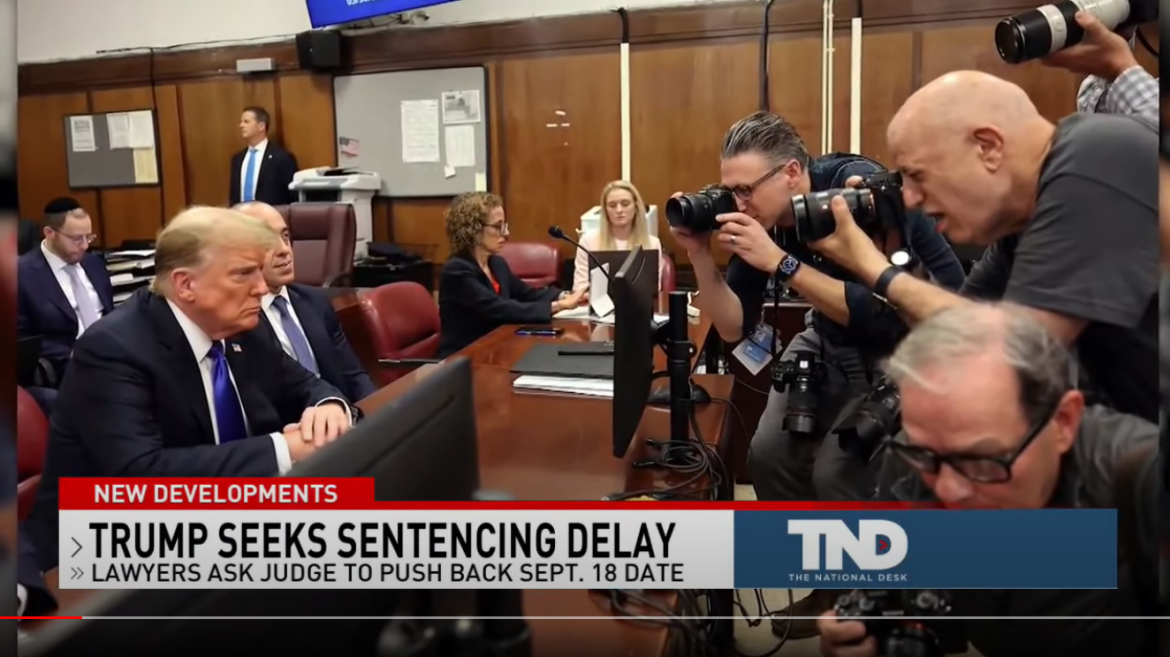As the legal drama surrounding former President Donald Trump continues to unfold, his legal team is actively seeking to delay his sentencing in the highly publicized hush-money case. This request comes as part of a broader strategy to push the sentencing date beyond the upcoming November presidential election, a move that reflects the increasingly complex legal and political landscape Trump navigates.
On September 18th, Trump is scheduled to be sentenced after being convicted in May of charges related to hush money payments made to an adult film star. These payments were allegedly intended to silence claims of an affair during the 2016 presidential campaign. The case has been a focal point of legal scrutiny, representing one of the many legal challenges Trump faces as he campaigns for a return to the White House.
Trump’s attorneys argue that a delay in sentencing is necessary to address ongoing legal challenges to his conviction. They contend that the current legal proceedings must be fully resolved before any sentencing can take place, particularly given the case’s potential impact on Trump’s political future. The legal team suggests that rushing to sentence Trump could undermine his right to a fair legal process and complicate the ongoing litigation.
This request is also seen as an attempt to avoid the political ramifications that a sentencing could have during the heat of the presidential campaign. If the sentencing proceeds as scheduled, it could significantly affect Trump’s candidacy and influence voter perceptions.
In a related development, Judge Juan Merchan, who presided over Trump’s criminal trial in New York, has once again denied a request from Trump’s legal team to recuse himself from the case. This marks the third time Trump has sought Merchan’s recusal, citing concerns over an alleged conflict of interest.
Trump’s legal team has argued that Merchan’s impartiality is compromised due to his daughter’s professional connections. Merchan’s daughter has worked as a Democratic consultant and is reported to have a “longstanding relationship” with Vice President Kamala Harris, who is currently the Democratic nominee for president. Trump’s team claims this relationship creates an appearance of bias, which could influence the judge’s decisions in the case.
However, Merchan has consistently rejected these arguments, maintaining that his daughter’s professional activities do not affect his ability to preside fairly over the case. He emphasized that there is no credible evidence to suggest any conflict of interest that would warrant his recusal.
The ongoing legal battles underscore the high stakes involved for Trump as he seeks to reclaim the presidency while navigating a complex web of legal challenges. The outcome of these proceedings could have far-reaching implications, not just for Trump but for the broader political landscape as well.
If Trump’s sentencing is delayed as requested, it could give him more time to campaign without the immediate shadow of a criminal sentence. Conversely, if the sentencing proceeds as scheduled, it could become a significant point of contention in the election, potentially swaying undecided voters or energizing his base.
The refusal of Merchan to step aside from the case also adds another layer of controversy, with Trump’s supporters likely to view the decision as further evidence of what they see as a biased legal system targeting the former president. On the other hand, Trump’s critics argue that his repeated attempts to remove Merchan are part of a broader strategy to undermine the legitimacy of the judicial process.
As the November election approaches, the intersection of legal battles and political campaigns will continue to be a defining feature of Trump’s bid for the presidency. The decisions made in the coming weeks and months could have a profound impact on both his legal fate and his political future.



